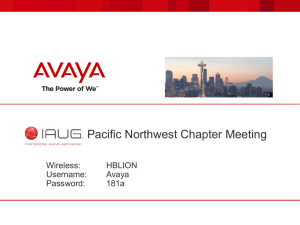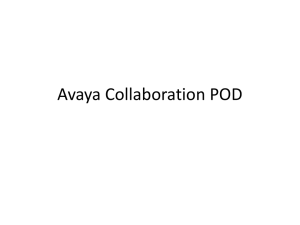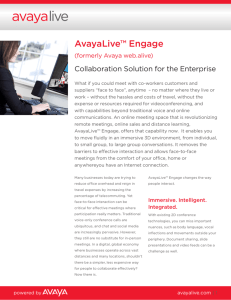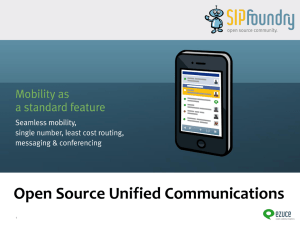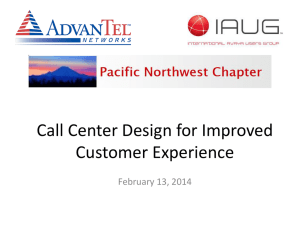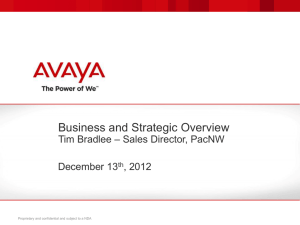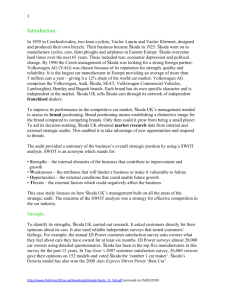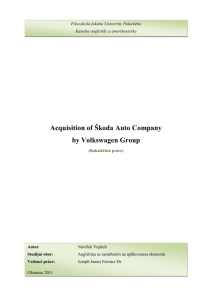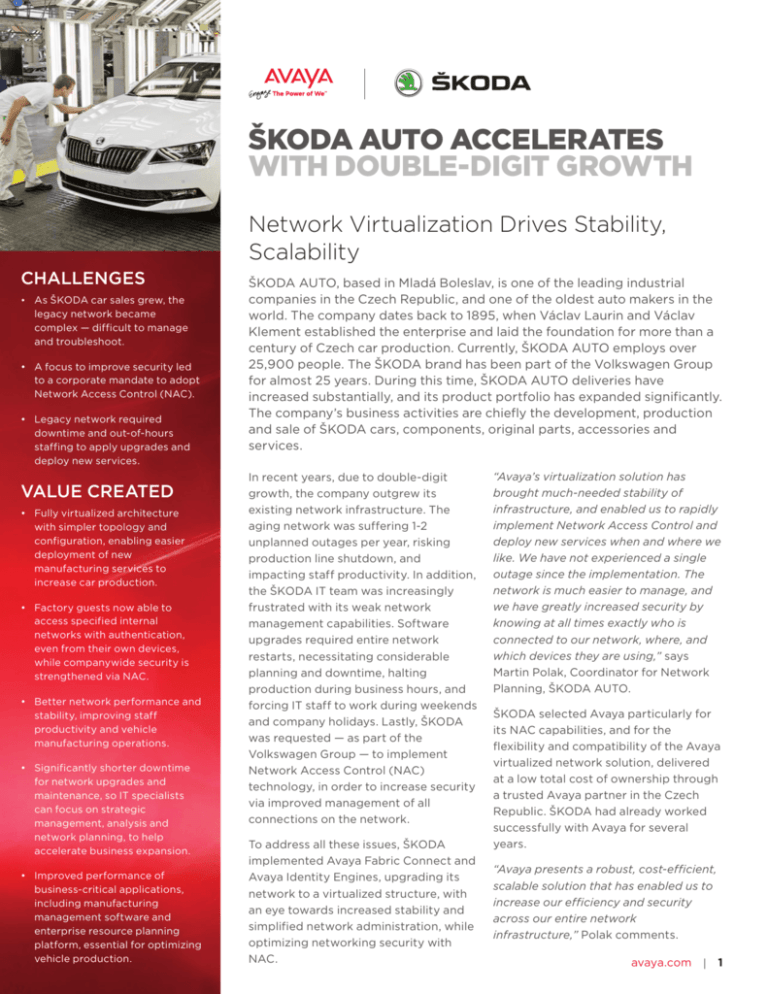
ŠKODA AUTO ACCELERATES
WITH DOUBLE-DIGIT GROWTH
Network Virtualization Drives Stability,
Scalability
CHALLENGES
• As ŠKODA car sales grew, the
legacy network became
complex — difficult to manage
and troubleshoot.
• A focus to improve security led
to a corporate mandate to adopt
Network Access Control (NAC).
• Legacy network required
downtime and out-of-hours
staffing to apply upgrades and
deploy new services.
VALUE CREATED
• Fully virtualized architecture
with simpler topology and
configuration, enabling easier
deployment of new
manufacturing services to
increase car production.
• Factory guests now able to
access specified internal
networks with authentication,
even from their own devices,
while companywide security is
strengthened via NAC.
• Better network performance and
stability, improving staff
productivity and vehicle
manufacturing operations.
• Significantly shorter downtime
for network upgrades and
maintenance, so IT specialists
can focus on strategic
management, analysis and
network planning, to help
accelerate business expansion.
• Improved performance of
business-critical applications,
including manufacturing
management software and
enterprise resource planning
platform, essential for optimizing
vehicle production.
ŠKODA AUTO, based in Mladá Boleslav, is one of the leading industrial
companies in the Czech Republic, and one of the oldest auto makers in the
world. The company dates back to 1895, when Václav Laurin and Václav
Klement established the enterprise and laid the foundation for more than a
century of Czech car production. Currently, ŠKODA AUTO employs over
25,900 people. The ŠKODA brand has been part of the Volkswagen Group
for almost 25 years. During this time, ŠKODA AUTO deliveries have
increased substantially, and its product portfolio has expanded significantly.
The company’s business activities are chiefly the development, production
and sale of ŠKODA cars, components, original parts, accessories and
services.
In recent years, due to double-digit
growth, the company outgrew its
existing network infrastructure. The
aging network was suffering 1-2
unplanned outages per year, risking
production line shutdown, and
impacting staff productivity. In addition,
the ŠKODA IT team was increasingly
frustrated with its weak network
management capabilities. Software
upgrades required entire network
restarts, necessitating considerable
planning and downtime, halting
production during business hours, and
forcing IT staff to work during weekends
and company holidays. Lastly, ŠKODA
was requested — as part of the
Volkswagen Group — to implement
Network Access Control (NAC)
technology, in order to increase security
via improved management of all
connections on the network.
To address all these issues, ŠKODA
implemented Avaya Fabric Connect and
Avaya Identity Engines, upgrading its
network to a virtualized structure, with
an eye towards increased stability and
simplified network administration, while
optimizing networking security with
NAC.
“Avaya’s virtualization solution has
brought much-needed stability of
infrastructure, and enabled us to rapidly
implement Network Access Control and
deploy new services when and where we
like. We have not experienced a single
outage since the implementation. The
network is much easier to manage, and
we have greatly increased security by
knowing at all times exactly who is
connected to our network, where, and
which devices they are using,” says
Martin Polak, Coordinator for Network
Planning, ŠKODA AUTO.
ŠKODA selected Avaya particularly for
its NAC capabilities, and for the
flexibility and compatibility of the Avaya
virtualized network solution, delivered
at a low total cost of ownership through
a trusted Avaya partner in the Czech
Republic. ŠKODA had already worked
successfully with Avaya for several
years.
“Avaya presents a robust, cost-efficient,
scalable solution that has enabled us to
increase our efficiency and security
across our entire network
infrastructure,” Polak comments.
avaya.com | 1
networks. The results were visible
immediately:
• Faster network performance
increasing staff and manufacturing
line productivity
• An increase in networking
operational efficiency, freeing IT
staff for strategic tasks
• Better availability of the
manufacturing management
software used throughout the
Volkswagen Group -- essential for
producing a high volume of
vehicles per day
• Enhanced performance of SAP
enterprise resource planning (ERP)
software, which supports ŠKODA’s
entire business operations
“
Avaya presents a robust,
cost-efficient, scalable
solution that has
enabled us to increase
our efficiency and
security across our
entire network
infrastructure.
—Martin Polak, Coordinator for
Network Planning, ŠKODA AUTO
Phased Deployment
with Off-Site Staging
ŠKODA kicked off its network
enhancement project in 2013, with the
upgrade of the backbone network at
its headquarters and a simultaneous
migration to virtualization. In 2014,
ŠKODA grew the cloud solution
across the backbone network for car
production facilities in Mladá Boleslav
and Kvasiny, and across access layer
switches in its data centers.
The implementation was facilitated by
support from Avaya, in which the
infrastructure was built and tested
before the first phase migration.
Avaya also provided on-site
consultation services to ŠKODA’s
networking specialists to help
determine the optimum migration
process, and ensure a smooth
installation.
Virtual Networking
Infrastructure
ŠKODA has a complex network
infrastructure, with operations spread
across its main manufacturing base at
Mladá Boleslav, assembly plants in
Kvasiny and Vrchlabi, and various
remote branches and office locations.
To cover all sites, ŠKODA deployed
several Avaya Fabric Connect
2 | avaya.com
“Thanks to the new generation of
Avaya switches, we have eliminated
the strain on our network which was
hindering the speed and direction of
our business growth and the
performance of our software
applications,” says Polak. “The
effectively-balanced communication
infrastructure from Avaya helps to
optimize staff performance across all
areas of the business.”
Multiple Improvements
Continual improvements in business
and car manufacturing efficiency are
essential to remaining competitive in
the car production industry. ŠKODA’s
IT department receives frequent
requests for adding new services for
car production plants, expanding the
infrastructure, or improving
performance—often with short
deadlines.
Benefits of the new network include
the ability to:
• Manage equipment remotely, to
improve efficiency and drive down
operations costs
• Gather data from sensors and
software, for real-time insight into
production bottlenecks, pending
maintenance issues, and other
issues
• Extract performance data from
machines and plants in real-time to
minimize errors and waste during
production
With the legacy infrastructure, it was
difficult to implement new services to
meet short deadlines, delaying the
optimization of ŠKODA’s operations
and undermining its competitiveness.
Using Avaya’s virtualization solution,
ŠKODA reduces time to market for
new business applications, as it can
upgrade or implement new services
with everything connected and
without requiring maintenance
windows. IT staff can easily perform
changes, saving ŠKODA employee
overtime costs.
“Now we simply install the new
software, test it, restart the switch and
move on to the next — with no system
restarts required. With this model, we
have minimized provisioning errors
and reduced the amount of network
downtime required for configuration
changes and upgrades to the
infrastructure by 50%,” says Polak.
With rapid business growth putting
pressure on ŠKODA’s network, IT
networking specialists had been
spending the majority of their time on
troubleshooting and maintaining
operation of the existing network.
Thanks to the simplified maintenance,
ŠKODA’s IT staff now focuses on
value-add strategic tasks to facilitate
the company’s continued growth
while keeping the network fine-tuned.
Headquarters, research and
development, manufacturing plants,
logistic sites, and parts warehouses
can take their mind off network issues
and deliver innovation to the
business.
“Now we manage everything online
and without service outages. We have
optimized the performance and
morale of our IT staff, which no longer
need to work out of hours to perform
upgrades,” Polak observes.
Improved Security with Stability, Business
Network Access Control Continuity
Each ŠKODA office, production site,
and subsidiary entity wants to protect
its data against external attacks.
ŠKODA’s infrastructure includes
dedicated independent networks for
printers, employee computers,
energy, telephones, emergency
power supplies, and various
technologies, including climate
control and closed circuit television
cameras. Historically, it was difficult
for ŠKODA to manage the different
types of access that users required.
Guests visiting its factories and
offices were not able to connect to
ŠKODA’s network through their own
devices, for example, to use the
Internet.
“Little things, like having a partner on
site to give a presentation, were
complicated. They always had to
prepare extremely well, anticipate
questions, and make sure all
components of their pitch were
available offline, sent ahead by email,
or even printed. Any unforeseen
questions could bring the discussion
to a halt and prolong business
negotiations by weeks,” Polak says.
Thanks to the deployment of Avaya
Identity Engines, guests can now
request and receive access to the
Internet or printers within a matter of
minutes, and physically or wirelessly
connect their own devices without
gaining unauthorized access to other
parts of the network. ŠKODA’s
independent virtual networks cannot
see each other but are connected
through firewalls and controlled
centrally with managed access to the
data according to corporate rules,
helping to increase security while
providing convenience for network
users.
“With Avaya Fabric Connect and
Avaya Identity Engines, we can rapidly
create new virtual networks for
different types of devices with various
access levels when our guests want to
use printers, the Internet, or the
phone,” comments Polak.
A service disruption of the network
infrastructure could cause problems
on production lines, even temporarily
halting car production. Just a couple
of hours of network downtime on
ŠKODA’s manufacturing operations
would have financial consequences
running into millions of Euros, as well
as impact orders from car distribution
partners and negatively affect
delivery commitments made to
customers. ŠKODA was experiencing
such outages in the past and the
troubleshooting was a complex, timeconsuming process.
By upgrading to Avaya Fabric
Connect and migrating to the SPB
cloud, ŠKODA’s network
infrastructure is now significantly
more robust against failures,
experiencing not a single outage
since deployment in 2013.
“Avaya’s virtualization solution and
Shortest Path Bridging provides us
with a robust infrastructure, and gives
us the flexibility to cope with any
networking problems. If there is an
outage or heavy network traffic in a
data center, we can rapidly
Key metrics to date
• Eliminated unplanned outages
• Virtual networks can be created
and configured in one hour instead
of one day, with zero configuration
mistakes
• Time required for service outages
due to configuration changes and
infrastructure upgrades reduced by
50%
• Mitigated financial risks associated
with outages which could run into
millions of Euros in operational and
missed-opportunity costs
avaya.com | 3
reconfigure our network and migrate half the data centre from one location to
another to ease the network strain and ensure business continuity,” Polak says.
Driving on the Road to Virtualization
A key attraction of Avaya Fabric Connect’ for the ŠKODA team was its virtualization
capabilities.
“We have already created 14 virtual networks,” comments Polak. “Using Avaya
Fabric Connect, we can create and configure a virtual network from one side of the
company to another in one hour, with zero configuration mistakes.”
“Before the implementation this would take up the whole day, and errors were easy
to make.”
Thanks to Avaya’s virtualization solution, ŠKODA is no longer dependent on a fixed
physical topology.
“Virtualization with Avaya makes it easy for us to develop and expand our network
in line with our growth in car sales, and gives us the flexibility to relocate networks
anywhere throughout the organization,” says Polak.
About ŠKODA AUTO
ŠKODA AUTO is one of the longest-established vehicle production companies in the
world. In 1895, the Czech headquarters in Mladá Boleslav began producing bicycles,
followed by the production of motorbikes and cars. ŠKODA currently offers the
following models: Citigo, Fabia, Rapid, Octavia, Yeti and Superb. In 2015, ŠKODA
AUTO delivered more than 1 million vehicles to customers worldwide. Since 1991,
ŠKODA has been a subsidiary of Volkswagen Group, one of the most successful
automotive groups in the world. ŠKODA, in association with the Group,
independently manufactures and develops vehicles, as well as components, engines
and gear transmissions. ŠKODA AUTO operates at three locations in the Czech
Republic, and produces products in China, Russia, Slovakia and India, mainly
through Group partnerships, as well as in Ukraine and Kazakhstan through local
partners. ŠKODA employs over 25,900 people globally, and is active in more than
100 countries.
About Avaya
Avaya is a leading,
global provider of
customer and team
engagement solutions
and services available
in a variety of flexible
on-premise and cloud
deployment options.
Avaya’s fabricbased networking
solutions help simplify
and accelerate the
deployment of business
critical applications
and services. For more
information, please visit
www.avaya.com.
avaya.com | 4
The ŠKODA AUTO network infrastructure currently consists of 105 backbone and
distribution switches (Avaya VSP 9000, VSP 8000, ERS 8800) and 2290 Access
switches (Avaya ERS 5000 series, ERS 4000 series, ERS 3000 series, VSP 7000,
VSP 4000) – 109,000 ports in total.
SOLUTIONS
Avaya Fabric Connect
Avaya Virtual Services Platform
4000 series
Avaya Virtual Services Platform
9000 series
Avaya Ethernet Routing Switch 4850
Avaya Virtual Services Platform
8000 series
Avaya Ethernet Routing Switch 8800
Avaya Virtual Services Platform
7000 series
Avaya Identity Engines
© 2016 Avaya Inc. All Rights Reserved.
Avaya and the Avaya logo are trademarks of Avaya Inc. and are registered in the
United States and other countries. All other trademarks identified by ®, TM, or SM
are registered marks, trademarks, and service marks, respectively, of Avaya Inc.
01/16 • DN7813-01

